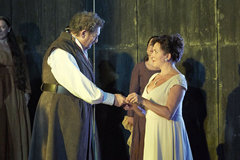| Opera Reviews | 27 April 2024 |
A night to remember as Domingo debuts as Rodrigoby Moore Parker |
|
| Verdi: Don Carlo Vienna State Opera 11 June 2017 |
|
|
This was the South Korean conductor’s first Don Carlo in the house - performed without the score, and of stylistic and technical dimension to rank with the greatest. Here was a rare combination of insight, technique, precision and intricate detail in all orchestral sections - yet never intellectual nor clinical in approach, and embracing the ideal Italianate warmth and passion to set the drama alight. In propelling the action forward, he at times tended toward highly energetic tempi (which in particular kept the chorus on their toes), but always underscored by the grandeur and expanse this score demands. Beginning with Ryan Speedo Green’s imposing and rock-solid Carlo V, the cast further featured Alexandru Moisiuc as an intensely focused (if vocally lightweight) Inquisitore, Margaret Plummer as a perfectly credible and musically meticulous Tebaldo, and an unusually rich-toned Voce dal cielo from a debuting Hila Fahima. In the title role, Ramón Vargas well-embodied the rather hapless Carlo, at times wanting a little in richness of timbre and volume, but generally winning the day with his reliable technique and boy-next-door appeal. Elena Zhidkova (in her first Vienna Eboli) built upon her show- stealing 2014 appearance opposite Angela Gheorghiu in Adriana Lecouvreur, and created a further svelte and intriguing Princess of immaculate vocal accuracy and taste, gilded with superbly considered detail. Her Veil Song was a tour-de-force, even-scaled without the hint of a vocal smudge and displaying a brilliant top and juicy (but refined) chest register. Zhidkova went on to use her physical veil as a kind of dramatic Leitmotiv in "Ed io, che tramava al suo aspetto!" - spanning the garment with venom as if to prepare for an act of strangulation, and later to underscore her undoing in her final scene. For some reason, "O don fatale" seemed oddly phased and didn’t quite live up to expectations, with the mezzo ultimately pushed in the aria’s final moments. Nevertheless, an auspicious debut in one of Verdi’s most testing mezzo roles. As Elisabetta, Krassimira Stoyanova presented a stoically-empathetic queen, courageous in her dealings with Filippo and endearingly touching in her scenes with Carlo, and in her heartfelt "Non pianger, mia compagna". Not intrinsically Italianate, her voice really divides into three distinct registers in a role like this - the lower and middle; warm and expressive, and the uppermost yielding exquisitely pure pianissimi - which, however, fail to quite blossom into the full-throated tones at times required to quite nail the phrase. Despite many lovely moments throughout the evening, Stoyanova’s style remains a touch square at times, lacking an appropriate glissando or portamento - and the ultimate imaginative finesse to make the reading truly memorable. Returning as Filippo II, Ferruccio Furlanetto remains a force to be reckoned with, still imposing in the sheer volume of his tone - if now hollow and somewhat marred by a tired vibrato (which fortunately can be more easily forgiven in the ageing characters often allocated to the bass voice). This evening saw the Italian artist (whose professional debut dates back nearly four-and-a-half decades) more extroverted and emotional than in previous renditions - and indeed, it’s not improbable that the entire cast was conscious of rising to the occasion for this rather historic event! And to the justly fèted protagonist of the show, Placido Domingo. Of all his undertakings in Verdi’s baritone repertoire, ironically, the youngest of the characters he has portrayed has transpired to be the septuagenarian’s greatest feat. His bright (and on this occasion, amazingly fresh and mellifluous) timbre filled the house easily in the role’s higher-lying passages (almost reminiscent of his salad days as a tenor), while displaying the dexterity and technique of the remarkable professional now familiar for so many decades, despite a slight deficit in breath control here and there. Domingo (even in this first showing) paced his energy and vocal stamina to facilitate the greatest imaginable effect - compelling in his Act II duet with Filippo, and culminating in a superb "Per me giunto".. to crown his performance. All-in-all, a night to remember.
|
|
| Text ©
Moore Parker Photo © Wiener Staatsoper / Michael Pöhn |

 Placido Domingo’s debut as Rodrigo at the age of 76 (with some 130 major roles to his credit and a remarkable 50th anniversary at the Vienna State Opera this season) represents an unquestionable milestone both for the Mexican-born legend, as indeed for the venue - and as an event, naturally deflected much of the limelight from the absolute revelation of the evening’s performance; Myung-Whun Chung’s reading in the pit.
Placido Domingo’s debut as Rodrigo at the age of 76 (with some 130 major roles to his credit and a remarkable 50th anniversary at the Vienna State Opera this season) represents an unquestionable milestone both for the Mexican-born legend, as indeed for the venue - and as an event, naturally deflected much of the limelight from the absolute revelation of the evening’s performance; Myung-Whun Chung’s reading in the pit.





